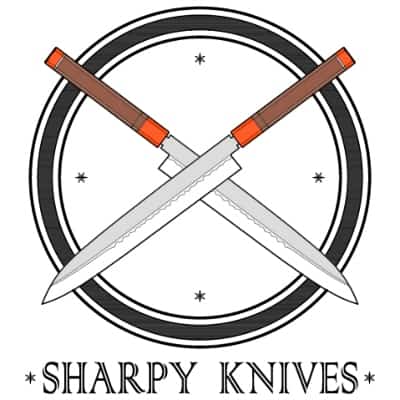As an Amazon Associate, we earn from qualifying purchases with no additional costs for you.
Fixed-blade knives have been around for longer than any other type of knife for good reason. There are many advantages to fixed-blade knives, most of them practical, but there are also some disadvantages in some circumstances. We will investigate the advantages and disadvantages of fixed-blade knives so you can decide if one of these knives meets your requirements.
Fixed-blade knives are durable, robust, and reliable, making them suitable for outdoor and rough work and heavy-duty tasks. There are some distinct disadvantages to fixed-blade knives, mostly regarding legal issues, social acceptability, and practicality for certain tasks.
Fixed-blade knives are popular among knife users because, in certain situations, a fixed blade provides superior performance compared to folding knives. If you are deciding between a fixed blade and a folding blade, check out our pros and cons of a fixed blade before you make your decision.
If you are interested in checking out the best fixed-blade EDC knife we recommend trying Ka-Bar Becker BK2 made be well-known KA-BAR Knives in NY, USA. You can find it by clicking here (Amazon link).

What Are Fixed Blade Knives Used For?
The fixed-blade knife design is as old as the first knife ever made. In the early days of human knife use, fixed blades were the only option.
This history means that fixed-blade knives have many uses and have become an integral part of our daily lives.
A fixed-blade knife is typically where the blade extends into the knife’s handle, and the blade has no folding mechanism to fold it into the handle. In a full tang fixed blade knife, the steel from the blade extends all the way through the handle, and the handle material is fixed to either side of the tang.
Hidden tang fixed blade knives are where the tang of the knife only extends partially through the handle, and the handle is usually a single piece of solid material.
Whether hidden tang or full tang, fixed-blade knives are used every day in some way or another. The following are some ways we use fixed-blade knives.
- Kitchen knives. All kitchen knives are fixed-blade knives because of their stability and durability.
- Hunting. Fixed blades are robust and have a good-sized blade for processing game on a hunt.
- Fishing. Processing fish is easier with a fixed blade due to the blade length.
- Survival. Reliability is important in a survival knife, which is why fixed blades are preferred for this application.
- Combat. Soldiers carry fixed-blade knives because of their durability and reliability, especially for hand-to-hand combat.
- Scuba diving. Their always ready-to-use characteristic means that a fixed blade is preferred by scuba divers who cannot fumble with a folding knife in an emergency.
- Camping. Fixed-blade knives make a useful tool in any camping situation, with the larger blade being more useful than folding knives with smaller blades.
These are just a handful of the main uses we have for fixed-blade knives, and I am sure you can add some more uses of your own to the list!
TIP: Many knife owners are unsure about knife sharpening, which causes them to leave knives longer than they should before sharpening. Check out why it is important to sharpen a knife before use in the article below:
4 Reasons Why It Is Important To Sharpen A Knife Before Use
Are Fixed Blade Knives Better?
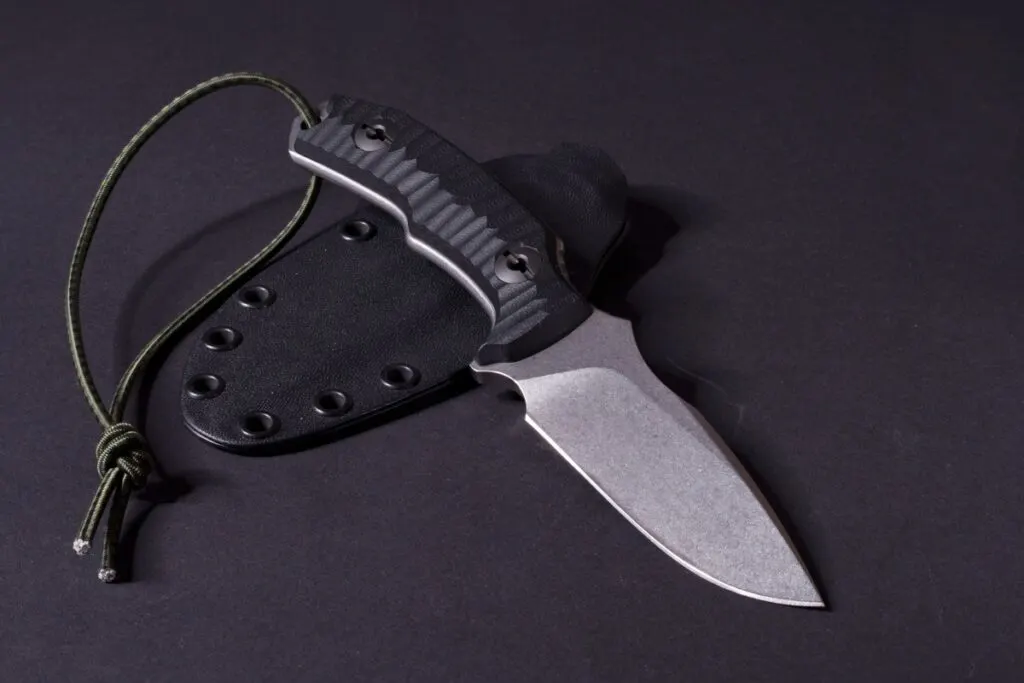
Fixed knives and folding knives both have their usefulness in different circumstances. This makes answering the question about which is better very subjective, depending on the reason you need the knife.
Fixed blades are better for situations and circumstances where a larger, more durable, and robust blade is required.
Fixed blades are better in situations where twisting or prying motions are required due to their more robust construction, especially between the blade and handle.
Are Fixed Blades Better Than Folding Knives?
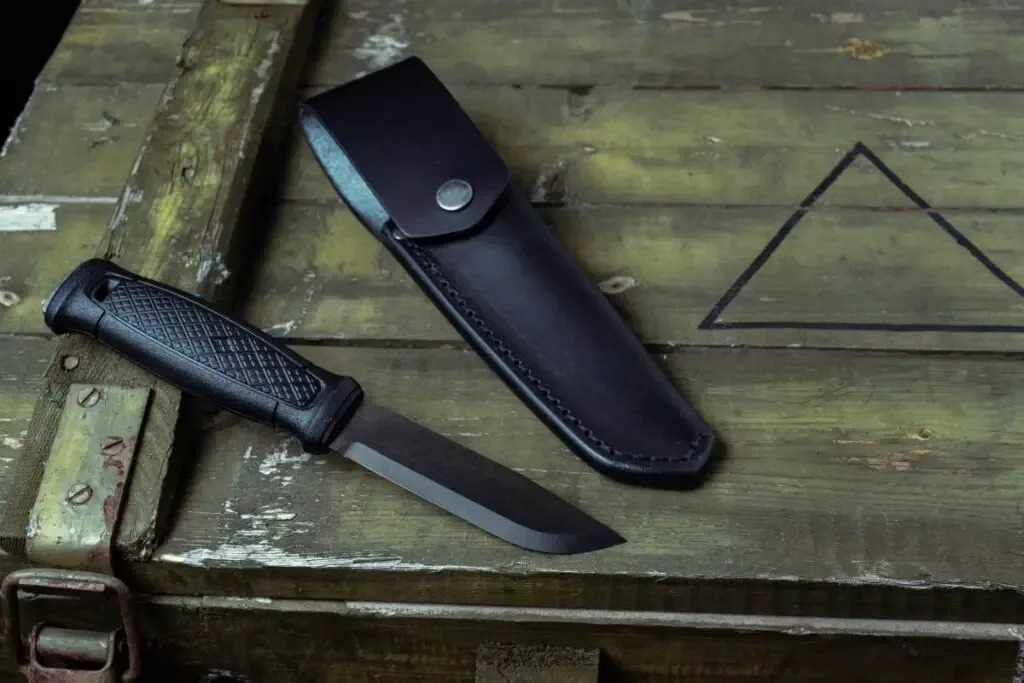
Fixed knives are better than folding blades in situations where a knife must be open and ready for use at a moment’s notice.
As soon as a fixed blade is retrieved from the sheath, it is ready for use, unlike a folding knife where the blade must first be opened.
The folding mechanism of a folding knife is the weak point of these types of knives. The folding mechanism can fail, become clogged with dirt and debris, and require maintenance to function optimally.
Folding knives have advantages over fixed blade knives, mostly in that they are easier to carry, are more socially acceptable, and in some cases, are not limited by legal constraints. However, a fixed-blade knife is the better choice, where durability and reliability are important.
TIP: Carbon steel and stainless steel are common steels used to manufacture knives and other cutting tools. Check out the main differences between these two steels in the article below:
Stainless Vs. Carbon Steel Knives: 12 Differences & Best One
Pros Of Fixed-Blade Knives
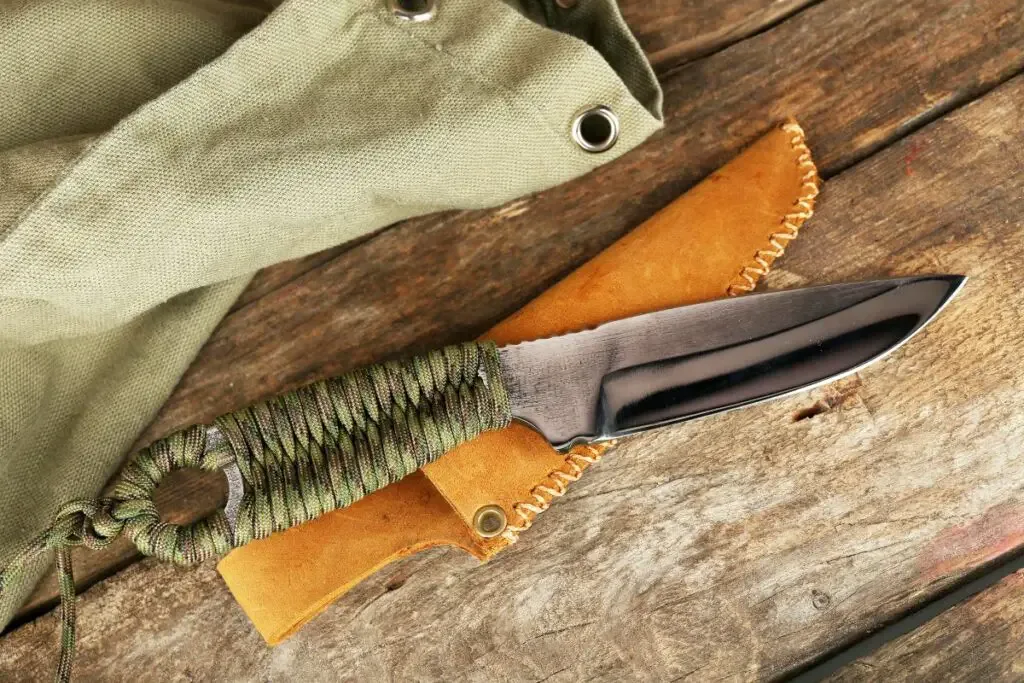
Fixed-blade knives have several benefits and characteristics that make them popular for many tasks and activities.
- Durability. Because of the way fixed-blade knives are constructed, they are more durable than most other knives. The steel used in the blade is generally thicker than that used in folding knives.
- Stronger. Fixed-blade knives have more robust construction than folding knives, making them more suitable for rough work than their folding counterparts.
- Easy to sharpen. A knife with a fixed blade is easy to sharpen because of the larger size of the blade.
- Larger blades. Larger blades are beneficial for many outdoor and rugged tasks, increasing the knife’s versatility in these circumstances.
- Last longer. The durability of fixed-blade knives means they have a longer lifespan than folding knives. A well-maintained fixed-blade knife can last a lifetime!
- No moving parts. Since a fixed-blade knife has no moving parts, there are no mechanisms that can cause a problem or fail when the knife is needed most. This characteristic increases the reliability of fixed-blade knives over folding knives.
- Safer to use. Larger knives are safer to use for larger tasks. There is less likelihood of the knife slipping or losing your grip at a crucial moment. A fixed blade will not accidentally close on your fingers, as some folding knife designs are prone to do.
- Easier to deploy. A fixed-blade knife is ready to use immediately after it is taken out of its protective sheath. You do not need to waste additional time trying to open the blade.
TIP: If you are interested in checking out the best fixed-blade EDC knife, we recommend trying Ka-Bar Becker BK2, made by well-known KA-BAR Knives in NY, USA. You can find it by clicking here (Amazon link).
Cons Of A Fixed Blade Knives
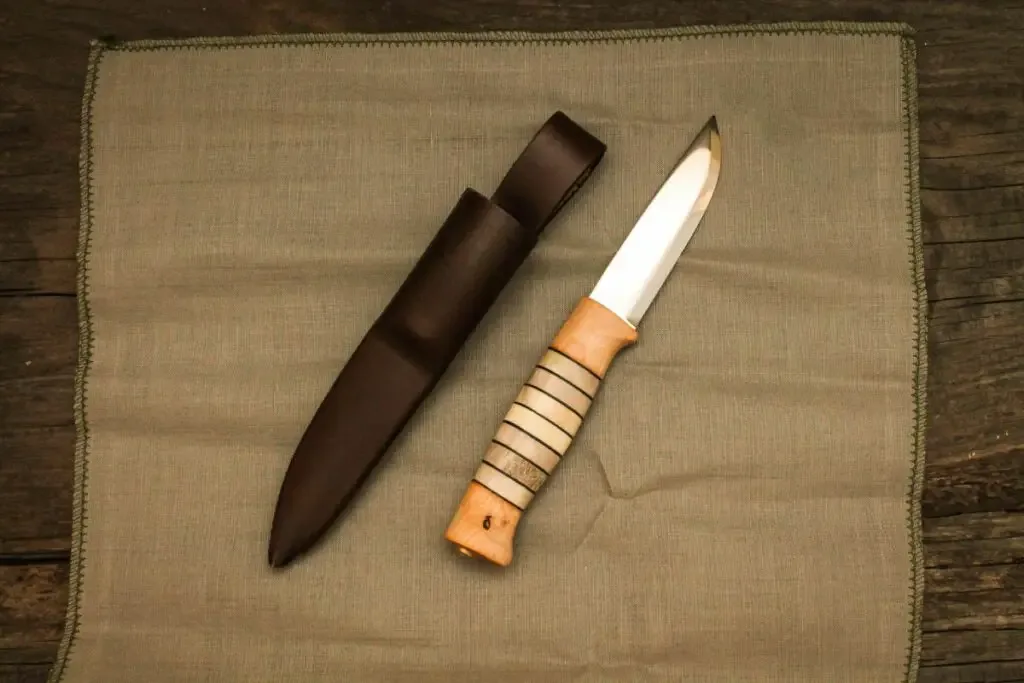
As with any knife, fixed-blade knives have some disadvantages, which make them unsuitable in certain circumstances.
Some of the disadvantages of fixed-blade knives are the main reason that these knives are not always used for everyday carry or EDC.
The main disadvantages of fixed-blade knives include the following.
- Difficult to carry. Fixed-blade knives are large and must be carried in a sheath fixed to your belt. They cannot be carried comfortably in a pocket in the same way that folding knives can be carried.
- Legal issues. There are legal implications for carrying a fixed-blade knife in certain locations. Certain jurisdictions limit the length of fixed-blade knives that can be carried and whether they can be concealed on your person or not.
- The blade can be too big for smaller tasks. Fixed-blade knives are typically larger knives and may not be suitable for certain fine or delicate tasks.
- Less socially acceptable. Certain buildings or establishments will not allow you to walk in with a fixed-blade knife on your hip, but the same places generally do not have a problem with a folding knife in your pocket.
- Weight. Fixed-blade knives are usually heavy, making them cumbersome for EDC.
- A damaged blade cannot be replaced. If a folding knife blade is damaged, it can be replaced with a new blade. This option is not available on a fixed-blade knife.
- Cost. Fixed-blade knives are typically more expensive to purchase than folding knives.
- Safety. Due to a fixed blade always being in the “out” position, it is easier for accidents to happen when the knife is carried or handled by children or inexperienced people.
BTW: If you are interested in buying the best cutting board, you can find our recommendations below:
- The best overall: Virginia Kitchen Boys Cutting Board (Amazon link). This fantastic cutting board is made from sustainable walnut wood from the United States and brings almost perfect safety when cutting with your knives.
- Alternative: Yoshihiro Cutting Board (Amazon link). Professional traditional Japanese cutting board that chefs around the world use.
- Cheaper option: Shun Cultery Cutting Board (Amazon link). Another Japanese cutting board stands out, especially for its simplicity and affordable price.
Fixed-Blade Knife FAQs
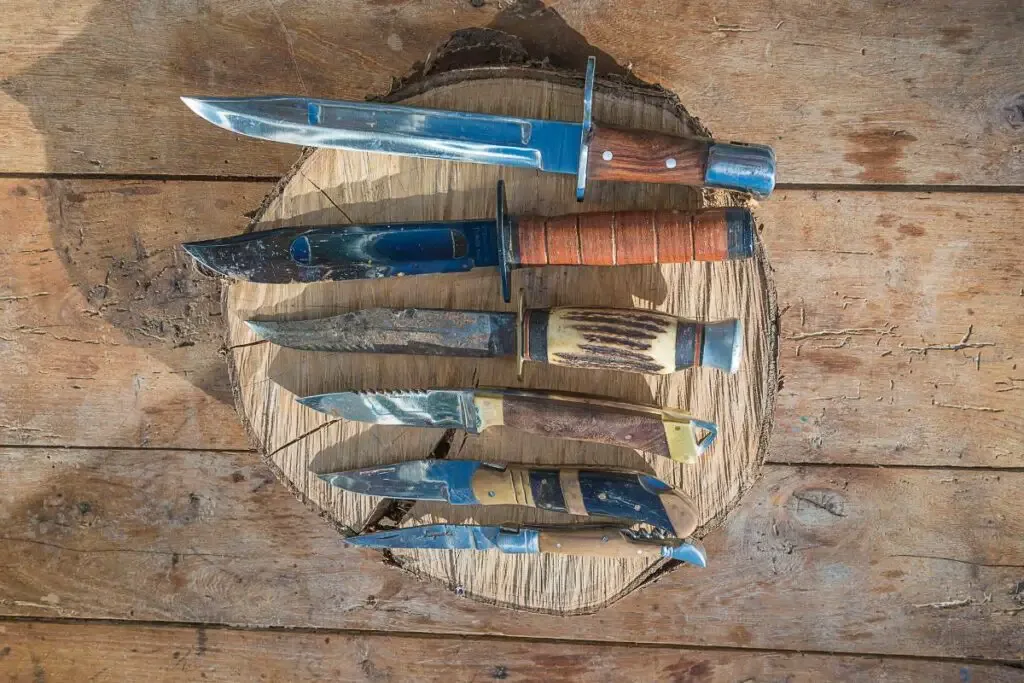
What are the legal considerations for carrying a fixed-blade knife?
The legality of carrying a fixed-blade knife varies significantly depending on your location. In many places, there are restrictions based on the blade length, the type of knife, and whether it’s concealed or openly carried.
Some regions may require a permit or have specific laws prohibiting the carry of fixed-blade knives in public spaces. It’s crucial to check and understand the local laws and regulations in your area or any area you plan to visit with your knife.
How do you maintain and care for a fixed-blade knife?
Proper maintenance is key to extending the life of your fixed-blade knife. Regular cleaning and drying are essential, especially after use in wet or dirty conditions.
Apply a light oil to the blade to prevent rust, and store your knife in a dry place. Sharpening the blade regularly is also important; use a quality sharpening stone or tool to keep the edge sharp and effective.
For knives with wooden handles, occasional treatment with a suitable wood conditioner can help maintain the handle’s integrity.
What are the best brands for fixed-blade knives?
Several reputable brands are known for their high-quality fixed-blade knives.
Some of the top brands include KA-BAR, known for their robust military and tactical knives; Benchmade, offering a range of high-end outdoor and survival knives; and Morakniv, renowned for their affordable yet durable bushcraft and outdoor knives.
Other notable brands include Gerber, Spyderco, and Buck Knives. The best brand for you will depend on your specific needs, preferences, and budget.
Can fixed-blade knives be used for everyday carry (EDC)?
While fixed-blade knives are not as commonly used for everyday carry as folding knives, they can be suitable for EDC in certain contexts.
The key is to choose a knife with an appropriate size and design for daily tasks and to ensure it’s carried in compliance with local laws. Compact fixed-blade knives with a sheath can be a practical option for EDC, especially for those who require a sturdy and reliable blade regularly.
What are the safety tips for using a fixed-blade knife?
Safety is paramount when handling any knife. Always cut away from your body, and ensure your fingers are clear of the blade’s path.
Use a stable and appropriate surface for cutting. When not in use, store the knife in its sheath to prevent accidents. Never attempt to catch a falling knife. Regularly inspect your knife for any damage or wear, and replace it if necessary.
Lastly, if you’re inexperienced with knife handling, consider taking a safety course to learn proper techniques.
Conclusion
Fixed-blade knives are useful, and for certain tasks, there is no replacement for a good-quality fixed blade. However, fixed blades are not appropriate for all situations and carry conditions and have some disadvantages in this regard.
Most knife owners prefer to have both fixed blade and folding knives available and use the appropriate knife that the circumstance demands. Of course, this is also the excuse that knife owners use to justify their knife collection!
TIP: A lanyard on a knife can benefit safety, grip, accessibility, and storage and prevent you from losing your knife. Find out an explanation of why it is good to use a lanyard on a knife in the article below:
5 Reasons Why To Use Lanyard On Your Knife & How To Use It
